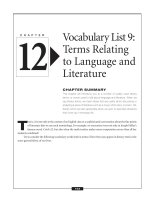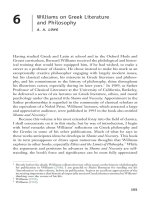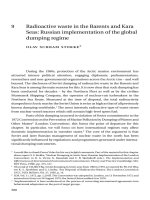VCE literature implementation briefing v2
Bạn đang xem bản rút gọn của tài liệu. Xem và tải ngay bản đầy đủ của tài liệu tại đây (2.27 MB, 35 trang )
VCE Literature
Implementation
briefing― 2016
Units 3 and 4
Goal
Develop deeper understanding of the new or
revised sections of the study design
We will achieve this goal by:
• unpacking key knowledge and skills
• clarifying common misconceptions and answering
common questions
• reviewing sample responses
• considering sample teaching and learning resources
and activities
• providing activities to be completed later.
Written examination
October/November
(on a date to be
published annually
by the VCAA)
Written examination
Marks
Task A — Literary perspectives
Assessment will be based on a
written response to a statement
related to one selected text from the
Literature Text List published
annually by the VCAA.
20
Task B — Close analysis
Assessment will be based on a
written response to passages from
one selected text from the Literature
Text List published annually by the
VCAA.
20
Total examination score
40
• Must not write on the same text twice
• Must not write on two texts of the same genre
Times
Reading time:
15 minutes
Writing time: 2
hours
‘The reader is disappointed that Jane Eyre ultimately
gives up her freedom and independence in order to
become a dutiful wife and carer to Rochester.’
‘The Bacchae is ultimately a play about the human
impulse to challenge an oppressive authority.’
‘Mansfield's characters often appear to feel a sense of
dislocation and alienation, uncertain of their place in
the word.’
‘The world of history and fiction collide in Beowulf.
As Tolkien states "Beowulf is in fact so interesting as
poetry... that this quite overshadows the historical
content.’
•
•
•
•
What views, values,
attitudes and ideas are
suggested/
foregrounded by the
statement?
How does this
perspective align with/
differ from your own
interpretation of the
text?
What other
perspectives support or
reject this perspective
either wholly or
partially?
What insights can you
gain from this
perspective that might
inform/ extend or
challenge your own
interpretation?
Some exam considerations
• The statements will:
o be reasonably short (reading time)
o will represent a perspective on the text
o will be specific to the text.
• Students will have choice of texts across the two
sections of the exam.
So…
• Changes to exam book and answer book.
• Students will approach the tasks in different ways to the
current exam.
• Development of skills across the units.
At a glance
Unit 1:
Approaches
to literature
Unit 2:
Context and
connections
Unit 3: Form
Unit 4:
and
Interpreting
transformation texts
Reading
practices
The text, the
reader and
their contexts
Adaptations
Literary
and
perspectives
transformations
Exploring
connections
between texts
Creative
responses to
texts
Areas of
study
Ideas and
concerns in
texts
Close
analysis
How would you
describe a student
at the end of the
four units?
UNIT 1: Approaches to
literature
UNIT 2: Context and
connections
Area of
study 1
Reading practices
The text, the reader and their contexts
Summary
• Similar to current Readers and their responses
area of study
• Refinements across area of study description,
outcome and key knowledge and skills
• Similar to current The text, the reader and their
contexts area of study
• Refinements across area of study description,
outcome and key knowledge and skills
Area of
study 2
Summary
Ideas and concerns in texts
Exploring connections between texts
• Similar to current Ideas and concerns in texts area • Similar to current Comparing texts area of study
of study
• Refinements across area of study description,
• Refinements across area of study description,
outcome and key knowledge and skills
outcome and key knowledge and skills
*One compulsory oral presentation
For
students
•
•
•
•
How I read texts is affected by my own
experiences, values, attitudes and my own
knowledge of texts (form, language).
My reading of a text can change over time.
Texts are deliberately constructed by authors.
Texts can present particular views and values
which may align or clash with my own values or
those of others.
•
•
•
The values presented can reflect particular
times, places, cultures.
My knowledge of the context in which a text was
created can help me interpret a text.
Texts are not created in isolation and my reading
of one text can help me understand another text
both in terms of features and ideas.
UNIT 3: Form and transformation
UNIT 4: Interpreting texts
Area of
study 1
Summary
Adaptations and transformations
Literary perspectives
• Similar to current Adaptations and
transformations area of study
• Refinements across area of study description,
outcome and key knowledge and skills
• A new area of study focusing on how engagement
with literary criticism can assist students to develop
their own interpretation of a text
• Builds on current Views, values and contexts and
Considering alternative viewpoints areas of study
Area of
study 2
Summary
Creative responses to texts
Close analysis
• Similar to current Creative responses to texts
• Similar to current Close analysis area of study
area of study
• Refinements across area of study description,
• Refinements across area of study description,
outcome and key knowledge and skills
outcome and key knowledge and skills
• Students complete a close analysis of two different
• Moved from Unit 4 to Unit 3 to improve
texts
coherence with Adaptations and transformations
area of study
*At least one assessment in Unit 3 must include an oral component.
For
students
•
•
•
The form of a text affects its meaning.
Building on my knowledge of texts, changing
the form of a text impacts on meaning,
including shifts in values, attitudes, ideas.
By working creatively to adapt a text into a new
form, I can deepen my understanding of how
changing the form impacts on meaning.
•
•
•
Many people write about texts
My own interpretations of texts can be enhanced,
expanded, challenged by engaging with the
interpretations of others.
Deep, close reading of texts, combined with my
developed understanding of form, features and
language, can enrich my understanding of texts
• Has an appreciation of
the power of language
and texts
• Has an appreciation of
the literary landscape,
including literary criticism
and a range of literary
forms and styles
• Has a range of tools at
their disposal to
approach and read new
texts.
Text selection
For Unit 1, students must study at least:
• two complete texts
• one additional text that is either complete or a collection
of excerpts
For Unit 2, students must study at least:
• two complete texts
• one additional text that is either complete or a collection
of excerpts.
Text selection
Students study at least six texts.
• Five of the required texts must be selected
from the Text List.
• The sixth text is an adaptation of one of the
above used for Unit 3 Outcome 1.
Units 1 ‒ 2 Teaching and learning
• The Advice for teachers resource contains
many examples of learning activities to
support each area of study in Units 1 and
2, including some in great detail.
• Implementation briefing material from last
year are available on the VATE website.
Oral assessment
Unit 1
One compulsory oral presentation
Unit 2
No oral presentation required
Unit 3
At least one assessment in Unit 3 must
include an oral component.
Unit 4
No oral presentation required
Sample oral presentation on study design webpage.
Literary perspectives
Key ideas:
• Develop the skills to approach and use
different literary perspectives to develop
their own interpretation of a text
• Grapple with the material to develop their
own voice and thinking
• Interrogate, analyse and evaluate the
perspectives of others
• Perspectives in context
Using literary perspectives
• Understanding and using a range of literary
perspectives helps us to read and interpret literature
critically and become critical thinkers.
• Texts emerge from social conditions and are
documents of a historical or ideological moment.
• So when we analyse literature we are not just
analysing texts but are using the texts to analyse the
world in which we live.
• These ideas encourage students to be self-reflexive
and critique the ways they usually read and to
become aware of the manner in which texts are
produced and read.
What are literary perspectives?
Across the study design, perspectives:
• reflect views, values, attitudes, ideas
• can be ‘lenses’ or particular ways of looking at texts
e.g. a feminist lens
• can be particular/specific interpretations e.g. a piece
of literary criticism from a particular lens or literary
criticism, review, article which is not informed by a
particular lens
What are literary perspectives?
In Unit 4:
For the purposes of this unit, literary criticism is
characterised by extended, informed and
substantiated views on texts and may include
reviews, peer-reviewed articles and transcripts of
speeches. Specifically, for Unit 4 Outcome 1, the literary
criticism selected must reflect different perspectives,
assumptions and ideas about the views and values of
the text/s studied.
How much literary criticism?
• Literary criticism is introduced in Unit 1
Area of Study 1:
apply understanding of literary criticism to their
reading of text/s
• Looking at appropriate literary criticism will
scaffold and support students with skills
across the study design by providing
models and revealing new insights
• The Unit 4, Outcome 1 SAC requires the
use of two perspectives (pieces of literary
criticism) that reflect different perspectives,
assumptions and ideas about the views
and values of the text/s studied so that
students are exposed to a range of
perspectives
• To develop the skills of approaching
literary perspectives, a range of
perspectives need to be studied.
How much literary theory?
Literary criticism
In your course, you will
only cover a ‘slice’ of
literary criticism, with a
little or a lot of theory, but
whatever ‘slice’ you select,
theory will be a part of
what you cover.
Literary criticism
informed by a
particular
theoretical lens
Approaching literary theory
• Short stories, nursery rhymes, poems,
riddles and fairy tales serve as an
excellent introduction to literary theory, as
students are familiar with them and enjoy
reminiscing and looking at stories from
their childhood from a different, often
mischievous, perspective.
• The brevity of such texts is also a bonus in
a task that can be complex and dense
Approaching literary theory
When reading literary criticism:
• Consider its assumptions, values,
Ideological perspectives, flaws and
strengths.
• How does the critic’s own background colour
their response to the text?
• Are there other ways to view/read the text?
Understanding literary theory
• TEXT refers to all texts, be they literature, film or society
itself
• At school we assume texts are innocent, and therefore we
read with the grain
• Post modernism makes the assumption that texts are not
innocent and encourages readers to read against the
grain, which is exactly what we need to do with the critics.
• Post modernism encourages us to search for evidence
about the way we construct and represent ourselves.
Understanding literary theory
In the past…
• Humanism assumed there were such things as
universal truths
• A good film or good literature was that which
represented humanity and the human condition
in a timeless fashion
• However, we then came to discover that low
and behold texts are susceptible to culture: viz;
sexuality, race, class and gender
• Texts are fundamentally political
Understanding literary theory
In a post-modern world, single, universal truths no
longer exist and the reader (student) is left to
create meaning.
• “The death of the author heralds the birth of the
reader”
• It is the reader or spectator who, via their
interpretation, creates meaning in the text
• We don’t know what the author/director
intended so we develop ways of understanding:
• Marxism, Feminism, Psychoanalysis and PostColonialism









